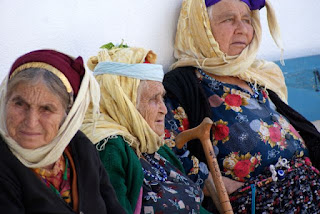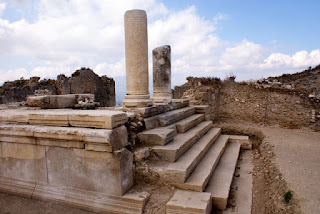 |
| On his bike |
I'd like it noted that when a warm wind blew in from the south mid-week, we on Enki, trained from childhood not to waste a good drying day, washed our salty curtains (the charter fleets hung out their sails en masse, which is much more sailorly). Sounds like a doddle, but in fact it was hell on the fingertips and the nails. I reckon there are close to 500 curtain hooks attaching Hallberg Rassy's silly little granny curtains (dispensed with in newer HR models) to their sliders, top and bottom. I was ready to give up almost before I'd started, but then Alex came up with A Method and I was in the groove. Not a major league boat job, not even one which made the List, but hey, you do what you can do - and freshly laundered curtains give my housewifely heart a lift.
Back on the cultural beat now.
From the time we decided to winter over in Marmaris, people we met along the way began pressing on us the name Gwen Bylund. "You must get on her email list," they said. "She organises everything." Alex and I didn't necessarily want to be organised, but Gwen, it turns out, is unavoidable. She's a Californian girl gone wild, a blowsy blonde with a backstory to turn her mother's hair white.
 |
| Pineapple - open all winter |
In her "old" age (I daren't ask, but she says she's getting old), she lives alone on a Nauticat motor sailer ketch which doesn't look like it leaves the dock too often anymore and vents her restlessness on the clueless bunch which washes up each year at the marina.
When you first "come in", Gwen (or 'KW' as she's known, that being the name of her boat) mails you her FAQ - it runs to 83 pages. Anything you think to ask, she's been asked before, and the answer's in the FAQ. She runs the morning cruisers' net on VHF 69, sorts out winter activities (like the Turkish lessons), takes delivery of a monthly discounted wine order, oils the Tuesday happy hour at the Pineapple, potluck dinners, the hectic December shopping in Izmir schedule etc.
But Gwen's real claim to fame are her land tours to known and lesser known corners of Turkey. We have met people who've decided to winter over in Marmaris in large part so they can join one or several of Gwen's tours. I find that surprising because the urge to sail your own boat across oceans shouldn't come bundled with a tolerance for coach travel (I think). But she must be doing something right, because cruisers from years past rave about Gwen's tours.
We've not signed up for any of her longer tours but yesterday we piled into a mini-bus with 14 others and headed off on a "mystery" day tour. There were no carpet shops, and no mandatory stops at tea houses. We were told to bring a packed lunch.
Our guide, Tas ("like Tasmanian devil") was a clever child with a masters degree in political economy, or some such incomprehensible qualification. A quick little devil with more English accents at his disposal than many Englishmen. His mobile face, river of words and the way he had of slicking back his hair reminded me so much of Alex's Mikey that I couldn't keep a silly smile off my face as I listened to him from the back of the bus.
The mysteries were: a spectacular temple to Zeus (one of very few in Asia Minor) at a place once known as Euromos, a lovely roadside site we'd not have found but for Gwen; a charming traditional Turkish village called Comakdag Kizilagac (don't ask me to say it) which seemed, miraculously, to be empty of tourists except for ourselves; and near the built-over ruins of Heraklia, somewhere north of Bodrum, beneath one of those bare rock ranges that still strike me dumb, a heaven in which to spread our picnic blanket in the shelter of a ruined monastery overlooking a lake of precious beauty....and discover a new (gasp) kind of rock tomb.
The old ladies in the villages were ready for us with their wares, and their voracious appetite for a sale would have put a Parramatta Road car salesman to shame. They play the game to win, and they won. But I'll leave Alex's photos to tell the rest of the story. There are times, I admit, when I think he's lost sight of anything other than boat systems theory. Then I need to pull out his photos - he sees so much more than I do, and in such tender detail. I'm so grateful for his eye.























































